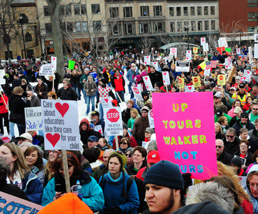Union Bosses Demand "More"
Writing in the Las Vegas Review Journal, Glenn Cook outlines how union endorsements of political candidates mean the candidate has abandoned the taxpayers in exchange for the campaign contributions and Big Labor union…

Writing in the Las Vegas Review Journal, Glenn Cook outlines how union endorsements of political candidates mean the candidate has abandoned the taxpayers in exchange for the campaign contributions and Big Labor union…

Writing in the Las Vegas Review Journal, Glenn Cook outlines how union endorsements of political candidates mean the candidate has abandoned the taxpayers in exchange for the campaign contributions and Big Labor union…

The power of the union bosses in California was on full display for the world to see when the legislature killed a bill that would have made it easier to investigate and fire teachers accused of serious misconduct. “Legislation to…

The embattled government workers’ union, AFSCME, elected its Secretary-Treasurer, Lee Saunders, as its next union boss after a bitter election that focused in part on whether the union should play aggressively in…
Forbes Magazine examines the impact of the National Right to Work Foundation’s latest Supreme Court’s victory in Knox vs. SEIU: The Supreme Court today rejected, on First Amendment grounds, the idea that government-employee unions can charge non-members…

National Right To Work Legal Defense Foundation attorneys lead by W. James Young fought to stop SEIU abuses of Dianne Knox and her fellow employees right not to be compelled to "subsidize a [SEIU] political effort designed to restrict their own rights." The U.S. Supreme Court 7-2 Opinion written by Justice Alito sets back another Big Labor easy political money scheme right before the 2012 elections. This decision should lead to new challenges to Big Labor's compulsory actions in the future. Two of the Justices, Breyer and Kagan, who opposed the right of individuals to voluntarily spend their own money on politics in the Citizen United case, both supported the notation that unions could compel people to unwillingly support politics that they oppose. From the Opinion: .... When a State establishes an “agency shop” that ex- acts compulsory union fees as a condition of public employment, “[t]he dissenting employee is forced to support financially an organization with whose principles and demands he may disagree.” Ellis, 466 U. S., at 455. Because a public-sector union takes many positions during collective bargaining that have powerful political and civic consequences, see Tr. of Oral Arg. 48–49, the compulsory fees constitute a form of compelled speech and association that imposes a “significant impingement on First Amendment rights.”

National Right To Work Legal Defense Foundation attorneys lead by W. James Young fought to stop SEIU abuses of Dianne Knox and her fellow employees right not to be compelled to "subsidize a [SEIU] political effort designed to restrict their own rights." The U.S. Supreme Court 7-2 Opinion written by Justice Alito sets back another Big Labor easy political money scheme right before the 2012 elections. This decision should lead to new challenges to Big Labor's compulsory actions in the future. Two of the Justices, Breyer and Kagan, who opposed the right of individuals to voluntarily spend their own money on politics in the Citizen United case, both supported the notation that unions could compel people to unwillingly support politics that they oppose. From the Opinion: .... When a State establishes an “agency shop” that ex- acts compulsory union fees as a condition of public employment, “[t]he dissenting employee is forced to support financially an organization with whose principles and demands he may disagree.” Ellis, 466 U. S., at 455. Because a public-sector union takes many positions during collective bargaining that have powerful political and civic consequences, see Tr. of Oral Arg. 48–49, the compulsory fees constitute a form of compelled speech and association that imposes a “significant impingement on First Amendment rights.”

If you live in the following states, Colorado, Florida, New Hampshire, Nevada, Ohio, Pennsylvania, Wisconsin and Virginia, you will have the privileged of seeing millions of dollars of forced union dues money spent to re-elect President Obama. The Service…

If you live in the following states, Colorado, Florida, New Hampshire, Nevada, Ohio, Pennsylvania, Wisconsin and Virginia, you will have the privileged of seeing millions of dollars of forced union dues money spent to re-elect President Obama. The Service…